计算机英语论文网络攻击与防御
大学生如何打击和预防网络犯罪英语作文

大学生如何打击和预防网络犯罪英语作文English: College students can combat and prevent cybercrime by practicing good cybersecurity habits, such as using strong and unique passwords, enabling two-factor authentication, and being cautious when clicking on links or downloading attachments. It is also important to keep software and antivirus programs up to date, not share personal information online, and be vigilant of phishing scams. Additionally, students should avoid using public Wi-Fi networks for sensitive activities and consider using a virtual private network (VPN) for added security. To prevent falling victim to online scams, students should verify the legitimacy of websites and only make online purchases from reputable sources. Lastly, it is crucial for college students to educate themselves about common online threats and report any suspicious activities to the appropriate authorities to help make the internet a safer place for all users.中文翻译: 大学生可以通过养成良好的网络安全习惯来打击和预防网络犯罪,比如使用强密码和独特密码、启用双因素验证以及在点击链接或下载附件时保持谨慎。
如何防范网络攻击作文

如何防范网络攻击作文英文回答:How to Defend Against Cyber Attacks.Cyber attacks have become increasingly prevalent in today's digital age. It is crucial for individuals and organizations to take proactive measures to protect themselves against these threats. In this essay, I will discuss some effective strategies to defend against cyber attacks.First and foremost, it is essential to keep all software and devices up to date. Regularly updating operating systems, antivirus software, and applications can help prevent cyber attacks. These updates often include security patches that address vulnerabilities and strengthen the system's defenses. For example, I always make sure to install the latest updates on my computer and smartphone to stay protected against potential threats.Another important aspect of defending against cyber attacks is creating strong and unique passwords. Many people make the mistake of using simple and easily guessable passwords, such as "123456" or "password." It is crucial to use a combination of uppercase and lowercase letters, numbers, and special characters to create strong passwords. Additionally, using different passwords for different accounts adds an extra layer of security. For instance, I use a password manager to generate and store complex passwords for all my online accounts.Furthermore, being cautious while browsing the internet and opening emails is vital. Cybercriminals often use phishing emails and malicious websites to trick users into revealing sensitive information or installing malware. Itis essential to verify the authenticity of emails and websites before clicking on any links or providing personal information. For instance, I always double-check the sender's email address and look for any suspicious signs before opening an email or clicking on a link.Additionally, backing up data regularly is an effective defense against cyber attacks. Ransomware attacks, where hackers encrypt files and demand a ransom for their release, have become increasingly common. By regularly backing up important files and data to an external hard drive or cloud storage, individuals and organizations can restore their information without paying the ransom. For example, I use a cloud storage service to automatically backup my filesevery week, ensuring that I always have a recent copy of my data.Lastly, educating oneself about cybersecurity best practices is crucial in defending against cyber attacks. Staying updated on the latest threats, learning about common attack techniques, and understanding how torecognize and respond to potential threats cansignificantly reduce the risk of falling victim to cyber attacks. For instance, I regularly read cybersecurity blogs and follow industry experts on social media to stayinformed about the latest trends and best practices.中文回答:如何防范网络攻击。
计算机英语论文网络攻击与防御

计算机英语论文网络攻击与防御第一篇:计算机英语论文网络攻击与防御计算机网络攻击和防范摘要:网络信息的安全和保密是一个至关重要的问题。
无论是在局域网还是在广域网中,都存在着自然和人为等诸多因素的脆弱性和潜在威胁。
关键词:计算机;网络;安全;防范引言:本文旨在介绍现在的网络安全问题,网络攻击的方式,步骤,防范。
防火墙的结构,类型,和具体应用。
使大家对于一般的网络攻击有所防范,可以用防火墙进行查杀和防护病毒。
正文:网络安全,是计算机信息系统安全的一个重要方面。
如同打开了的潘多拉魔盒,计算机系统的互联,在大大扩展信息资源的共享空间的同时,也将其本身暴露在更多恶意攻击之下。
如何保证网络信息存储、处理的安全和信息传输的安全的问题,就是我们所谓的计算机网络安全。
信息安全是指防止信息财产被故意的或偶然的非法授权泄露、更改、破坏或使信息被非法系统辩识、控制;确保信息的保密性、完整性、可用性、可控性。
信息安全包括操作系统安全、数据库安全、网络安全、病毒防护、访问控制、加密和鉴别七个方面。
设计一个安全网络系统,必须做到既能有效地防止对网络系统的各种各样的攻击,保证系统的安全,同时又要有较高的成本效益,操作的简易性,以及对用户的透明性和界面的友好性。
网络安全攻击,主要有四种方式L中断、截获、修改和伪造。
中断是以可用性作为攻击目标,它毁坏系统资源,使网络不可用。
截获是以保密性作为攻击目标,非授权用户通过某种手段获得对系统资源的访问。
修改是以完整性作为攻击目标,非授权用户不仅获得访问而且对数据进行修改。
伪造是以完整性作为攻击目标,非授权用户将伪造的数据插入到正常传输的数据中。
网络安全的解决方案一、入侵检测系统部署入侵检测能力是衡量一个防御体系是否完整有效的重要因素,强大完整的入侵检测体系可以弥补防火墙相对静态防御的不足。
对来自外部网和校园网内部的各种行为进行实时检测,及时发现各种可能的攻击企图,并采取相应的措施。
具体来讲,就是将入侵检测引擎接入中心交换机上。
如何防范网络攻击作文
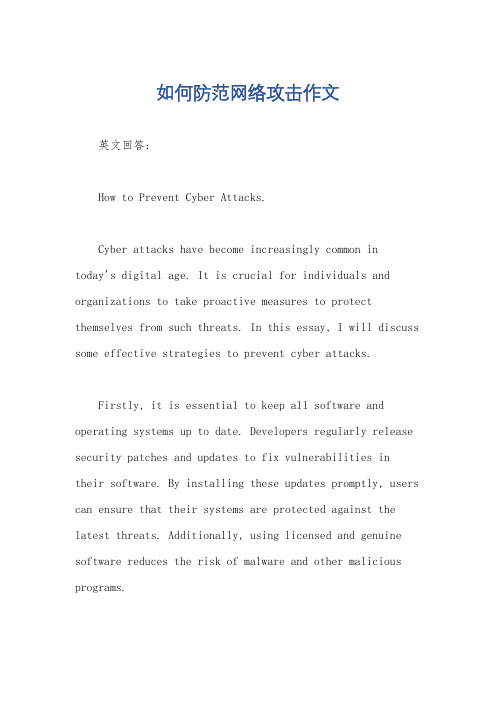
如何防范网络攻击作文英文回答:How to Prevent Cyber Attacks.Cyber attacks have become increasingly common intoday's digital age. It is crucial for individuals and organizations to take proactive measures to protect themselves from such threats. In this essay, I will discuss some effective strategies to prevent cyber attacks.Firstly, it is essential to keep all software and operating systems up to date. Developers regularly release security patches and updates to fix vulnerabilities intheir software. By installing these updates promptly, users can ensure that their systems are protected against the latest threats. Additionally, using licensed and genuine software reduces the risk of malware and other malicious programs.Secondly, strong and unique passwords are vital for safeguarding online accounts. Many people make the mistake of using easy-to-guess passwords or reusing the same password for multiple accounts. This makes it easier for hackers to gain unauthorized access. It is recommended to use a combination of uppercase and lowercase letters, numbers, and special characters in passwords. Furthermore, enabling two-factor authentication adds an extra layer of security by requiring users to provide a secondverification code or fingerprint scan.Another important measure is to be cautious while clicking on links or downloading attachments. Phishing emails and malicious websites often trick users into revealing sensitive information or installing malware. It is advisable to verify the authenticity of emails and websites before sharing personal or financial details. Additionally, using reliable antivirus software can help detect and remove potential threats.Regularly backing up important data is also crucial in preventing cyber attacks. Ransomware attacks, where hackersencrypt data and demand a ransom for its release, can be devastating. By regularly backing up data to an external hard drive or cloud storage, individuals and organizations can minimize the impact of such attacks. It is important to ensure that backups are stored securely and are not accessible to unauthorized individuals.Lastly, cybersecurity awareness and training play a significant role in preventing cyber attacks. Individuals should stay informed about the latest threats and best practices for online security. Organizations should conduct regular training sessions to educate employees about the importance of following security protocols and identifying potential risks.In conclusion, preventing cyber attacks requires a combination of technical measures and user awareness. By keeping software up to date, using strong passwords, being cautious while browsing, regularly backing up data, and promoting cybersecurity awareness, individuals and organizations can significantly reduce the risk of falling victim to cyber attacks.中文回答:如何防范网络攻击。
通过网络非法入侵的英语作文

通过网络非法入侵的英语作文Cyber intrusion has become a rampant issue in today's digital age. Individuals and organizations alike are falling victim to malicious cyber attacks, resulting in stolen personal information, financial losses, and damaged reputations. 网络入侵已经成为当今数字时代的猖獗问题。
个人和组织都成为恶意网络攻击的受害者,导致个人信息被盗,财务损失,以及声誉受损。
One of the main challenges of combating cyber intrusion is the difficulty in tracing the perpetrators. With the anonymity provided by the internet, hackers can easily cover their tracks and evade detection by law enforcement agencies. This lack of accountability makes it easier for hackers to carry out their attacks without fear of consequences. 打击网络入侵的主要挑战之一是在追踪肇事者时的困难。
在互联网提供的匿名性下,黑客可以轻松地掩盖自己的踪迹,逃避执法机构的检测。
这种缺乏责任感使得黑客更容易在没有后果的情况下进行攻击。
Moreover, the rapid advancements in technology have made it easier for cyber criminals to exploit vulnerabilities in systems and networks. With the increasing connectivity of devices and the rise of theInternet of Things (IoT), there are more entry points for hackers to infiltrate and wreak havoc. This constant evolution of technology poses a significant challenge for cybersecurity professionals in staying ahead of cyber threats. 此外,技术的快速发展使得网络犯罪分子更容易利用系统和网络中的漏洞。
保护网络安全的英文作文
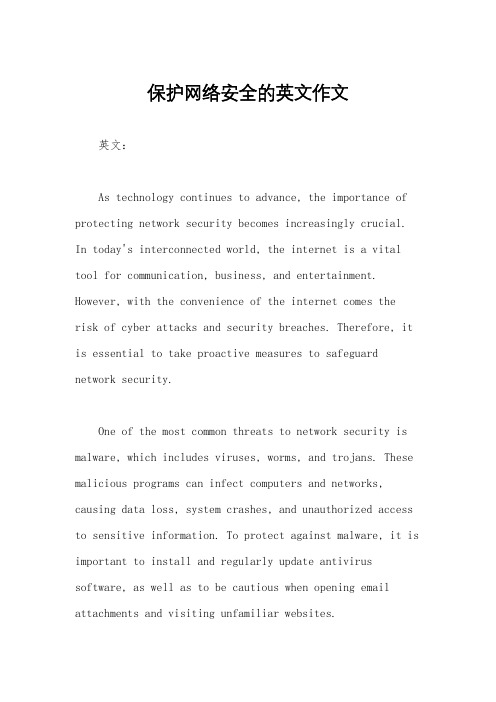
保护网络安全的英文作文英文:As technology continues to advance, the importance of protecting network security becomes increasingly crucial. In today's interconnected world, the internet is a vital tool for communication, business, and entertainment. However, with the convenience of the internet comes therisk of cyber attacks and security breaches. Therefore, it is essential to take proactive measures to safeguard network security.One of the most common threats to network security is malware, which includes viruses, worms, and trojans. These malicious programs can infect computers and networks, causing data loss, system crashes, and unauthorized access to sensitive information. To protect against malware, it is important to install and regularly update antivirus software, as well as to be cautious when opening email attachments and visiting unfamiliar websites.Another significant threat is phishing, where cyber criminals attempt to deceive individuals into providing personal information such as passwords and credit card numbers. Phishing attacks often come in the form of fake emails or websites that mimic legitimate organizations. To defend against phishing, it is crucial to verify the authenticity of requests for personal information and to never click on suspicious links or provide sensitive data to unknown sources.In addition to external threats, insider threats also pose a risk to network security. Employees or individuals with access to a network may intentionally or unintentionally compromise its security by sharing confidential information or falling victim to social engineering tactics. To mitigate insider threats, organizations should implement strict access controls, conduct regular security training for employees, and monitor network activity for any suspicious behavior.Furthermore, the use of weak passwords and lack ofencryption can make networks vulnerable to unauthorized access. It is important for individuals and organizations to use strong, unique passwords for their accounts and to enable encryption for sensitive data. Additionally, regular data backups are essential to ensure that valuable information can be recovered in the event of a security breach.Overall, protecting network security requires a combination of technology, education, and vigilance. By staying informed about the latest security threats and best practices, individuals and organizations can minimize the risk of cyber attacks and safeguard their digital assets.中文:随着技术的不断进步,保护网络安全的重要性变得日益关键。
大学生如何打击和预防网络犯罪英语作文

大学生如何打击和预防网络犯罪英语作文English: As college students, there are several ways to combat and prevent cybercrimes. Firstly, it is important to be aware of the potential risks of cybercrimes, such as identity theft, phishing scams, and hacking. By educating ourselves about these threats, we can better protect our personal information and avoid falling victim to these crimes. Secondly, we should always use strong and unique passwords for our online accounts, and enable two-factor authentication whenever possible. This can help prevent unauthorized access to our accounts and protect our sensitive data. Additionally, we should be cautious about the information we share online, and avoid clicking on suspicious links or downloading unknown attachments. It is also important to regularly update our security software and keep our devices and systems patched to minimize vulnerabilities. Lastly, if we ever do become a victim of cybercrime, it is crucial to report the incident to the relevant authorities and seek help from IT professionals to mitigate the damage and prevent future attacks.中文翻译: 作为大学生,我们有几种方法可以打击和预防网络犯罪。
计算机英语论文网络攻击与防御报告
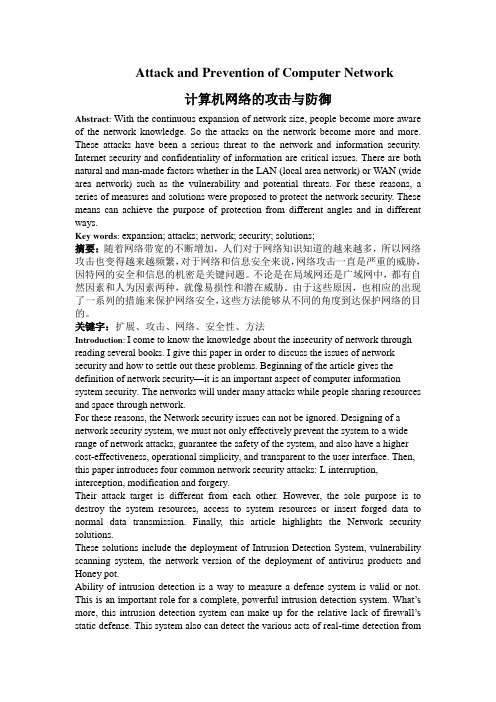
Attack and Prevention of Computer Network计算机网络的攻击与防御Abstract: With the continuous expansion of network size, people become more aware of the network knowledge. So the attacks on the network become more and more. These attacks have been a serious threat to the network and information security. Internet security and confidentiality of information are critical issues. There are both natural and man-made factors whether in the LAN (local area network) or WAN (wide area network) such as the vulnerability and potential threats. For these reasons, a series of measures and solutions were proposed to protect the network security. These means can achieve the purpose of protection from different angles and in different ways.Key words: expansion; attacks; network; security; solutions;摘要:随着网络带宽的不断增加,人们对于网络知识知道的越来越多,所以网络攻击也变得越来越频繁,对于网络和信息安全来说,网络攻击一直是严重的威胁,因特网的安全和信息的机密是关键问题。
如何防范网络攻击为主题的作文
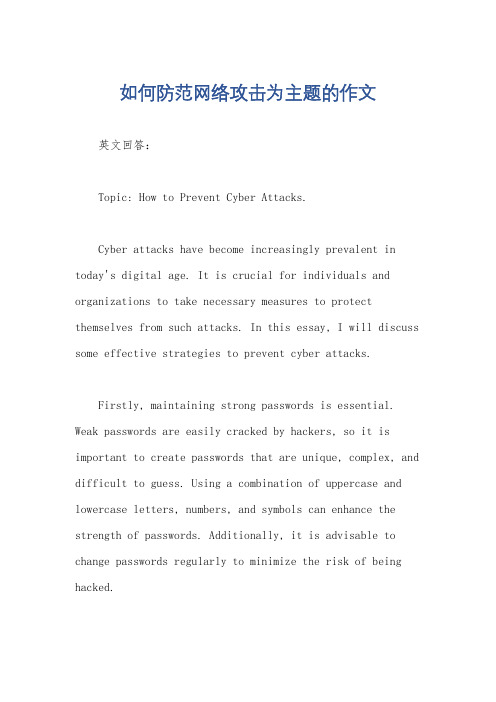
如何防范网络攻击为主题的作文英文回答:Topic: How to Prevent Cyber Attacks.Cyber attacks have become increasingly prevalent in today's digital age. It is crucial for individuals and organizations to take necessary measures to protect themselves from such attacks. In this essay, I will discuss some effective strategies to prevent cyber attacks.Firstly, maintaining strong passwords is essential. Weak passwords are easily cracked by hackers, so it is important to create passwords that are unique, complex, and difficult to guess. Using a combination of uppercase and lowercase letters, numbers, and symbols can enhance the strength of passwords. Additionally, it is advisable to change passwords regularly to minimize the risk of being hacked.Secondly, keeping software and operating systems up to date is crucial in preventing cyber attacks. Developers release updates and patches to fix vulnerabilities and security loopholes in their software. By regularly updating our devices, we can ensure that we have the latest security measures in place to protect against potential attacks.Thirdly, being cautious while browsing the internet is vital. Many cyber attacks occur through phishing emails or malicious websites. It is important to be wary of suspicious emails or messages from unknown sources, as they may contain malicious links or attachments. Additionally, it is advisable to only visit reputable websites and avoid clicking on suspicious ads or pop-ups.Furthermore, using antivirus software and firewalls can provide an additional layer of protection against cyber attacks. Antivirus software can detect and remove malware, while firewalls can block unauthorized access to our devices or networks. It is essential to regularly update and scan our devices with antivirus software to ensure maximum protection.Lastly, educating ourselves and raising awareness about cyber security is crucial. By understanding common cyber attack methods such as phishing, malware, and ransomware, we can better identify and prevent potential threats. It is important to stay updated on the latest trends and best practices in cyber security to effectively safeguard ourselves and our digital assets.In conclusion, preventing cyber attacks requires a combination of proactive measures and awareness. By maintaining strong passwords, keeping software up to date, being cautious while browsing the internet, using antivirus software and firewalls, and staying informed about cyber security, we can significantly reduce the risk of falling victim to cyber attacks.中文回答:主题,如何防范网络攻击。
外文文献-计算机网络安全和防范
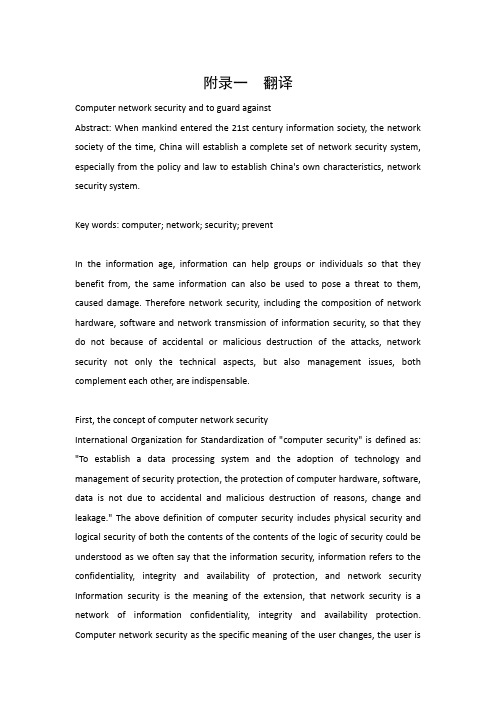
附录一翻译Computer network security and to guard againstAbstract: When mankind entered the 21st century information society, the network society of the time, China will establish a complete set of network security system, especially from the policy and law to establish China's own characteristics, network security system.Key words: computer; network; security; preventIn the information age, information can help groups or individuals so that they benefit from, the same information can also be used to pose a threat to them, caused damage. Therefore network security, including the composition of network hardware, software and network transmission of information security, so that they do not because of accidental or malicious destruction of the attacks, network security not only the technical aspects, but also management issues, both complement each other, are indispensable.First, the concept of computer network securityInternational Organization for Standardization of "computer security" is defined as: "To establish a data processing system and the adoption of technology and management of security protection, the protection of computer hardware, software, data is not due to accidental and malicious destruction of reasons, change and leakage." The above definition of computer security includes physical security and logical security of both the contents of the contents of the logic of security could be understood as we often say that the information security, information refers to the confidentiality, integrity and availability of protection, and network security Information security is the meaning of the extension, that network security is a network of information confidentiality, integrity and availability protection. Computer network security as the specific meaning of the user changes, the user isdifferent on the network security awareness and requirements will be different. From the ordinary user's point of view, could only hope that personal privacy or confidential information transmission on the network be protected against eavesdropping, tampering and forgery; and network provider in addition to care about these network information security, we must also consider how to deal with sudden natural disasters, such as military strikes against the destruction of network hardware, as well as unusual in the network how to restore network communications, and maintain the continuity of network communications.In essence, the network security, including the composition of network hardware, software and network transmission of information security, so that they do not because of accidental or malicious attacks on the destruction of both the technical aspects of network security issues, there are management issues, the two sides complement each other, are indispensable. Man-made network intrusion and attacks makes network security is facing new challenges.Second, computer network security status quoComputer network security is the network hardware, software and data systems are protected from accidental or malicious destruction of reasons, alteration, disclosure, the system continuous, reliable, normal operation of network services without disruption. Computer and network technology has the complexity and diversity, makes computer and network security has become a need to continue to update and improve the area. At present, hackers method has been more than the type of computer virus, and many attacks are fatal. In the Internet network, because the Internet does not have the time and geographical constraints, whenever there is a means to generate new attacks, we can in a week around the world, these attacks means the use of network and system vulnerabilities to attack computer systems and resulting in network paralysis. Worms, backdoor (Back-doors), Rootkits, DOS (DenialofServices) and Sniffer (network monitor) is a familiar means of several hacker attacks. However, none of these attacks means they reflect the astonishing power of today become worse. These types of attacks means the new variant, with previousattacks appeared methods, more intelligent, targeted against Internet-based protocols and operating system level. From the Web process control procedures to the kernel-level Rootlets. Hackers practices escalating renovation, to the user's ability to guard against information security challenge.Third, computer network security precautions1, to strengthen the internal network management and the use of safety awareness among staff, many computer systems commonly used passwords to control access to system resources, which is anti-virus process, the most vulnerable and the most economical methods. Network administrator and terminal operator privileges in accordance with their responsibilities, choose a different password for the application data legitimate operation, to prevent unauthorized users to access the data and the use of network resources.On the network, software installation and management is crucial, it is not only related to network maintenance and management efficiency and quality, but also to the network security. A good antivirus software can be easily installed within minutes to the organization each NT server can also be downloaded and spread to all the purpose of the machine by the network administrator set up and manage to focus, it will work with the operating system and other security is closely linked to become a part of network security management, and automatically provide the best network virus defensive measures. When the computer virus on-line resources applications attack, such as the virus exists in the information-sharing network of media, it is necessary to the security at the gateway, on the network front-end for antivirus.2, network firewall technologyIs a kind of used to strengthen the network access control to prevent the external network users to illegal means to enter the external network through the internal network, access internal network resources and protect the internal network operating environment special for Network Interconnection Devices. It is between two or more networks such as packet transmission link in accordance with a certain degree of security strategy to implement the inspection, to determine whether thenetwork communication between are allowed to, and monitor the network running. Although the firewall is to protect the network from an effective means of hacking, but there are obviously inadequate: through the firewall can not protect against outside attack other means, can not prevent defectors from the inside and inadvertent threats posed by users, but also can not completely prevent the transmission of the virus have been infected with the software or documents, and can not protect against data-driven attacks.3, security encryption technologyEncryption technology for the global e-commerce to provide a guarantee, so that Internet-based electronic trading system has become possible, thus improving the symmetric encryption and asymmetric encryption technology is still the mainstream of the 21st century. Symmetric encryption to the conventional password-based technology, computing encryption and decryption operations use the same key. Asymmetric encryption, encryption key that is different from the decryption key, encryption keys are made public, anyone can use, only the decryption key to decrypt people know.4, the network host operating system security and physical security measures Network firewall as the first line of defense and can not fully protect the internal network, must be combined with other measures to improve the safety of the system level. After the firewall is based on the network host operating system security and physical security measures. In accordance with the level from low to high, namely, the physical security of the host system, the core operating system security, system security, application services security and file system security; At the same time, host security checks and bug fixes, as well as a backup safety system as a supplementary safety measures. These constitute the entire network system, the second line of defense, the main part of a breakthrough to prevent the firewall as well as attacks from within. System backup is the last line of defense network system, used to attack after the System Restore. The firewall and host security measures is the overall system security by auditing, intrusion detection and response processor constitute the overall safety inspection and response measures. It from the networksystem firewall, network host or even directly from the network link layer on the extraction of network status information, as input to the intrusion detection subsystem. Intrusion Detection System in accordance with certain rules to determine whether there is any invasion of the incident, if the invasion occurred, the emergency treatment measures, and generate a warning message. Moreover, the system's security audit also can be used as the future consequences of aggressive behavior and to deal with security policy on the system to improve sources of information.In short, network security is a comprehensive issue, involving technology, management, use and many other aspects, including both its own information system security issues, there are physical and logical technical measures, a kind of technology can only solve the problem on the one hand, rather than a panacea. To this end the establishment of a network with Chinese characteristics, security system, the need for national policies and regulations to support and joint research and development group. Security and anti-security like two sides of contradictions, always pick-up, so the security industry is a future with the development of new technologies and the continuous development of industry.计算机网络安全和防范摘要:当人类跨入21世纪的信息社会,网络社会的时候,我国将建立一套完整的网络安全系统,特别是从政策和法律,建立我国自己的特点,网络安全系统。
如何防护网络安全英语作文
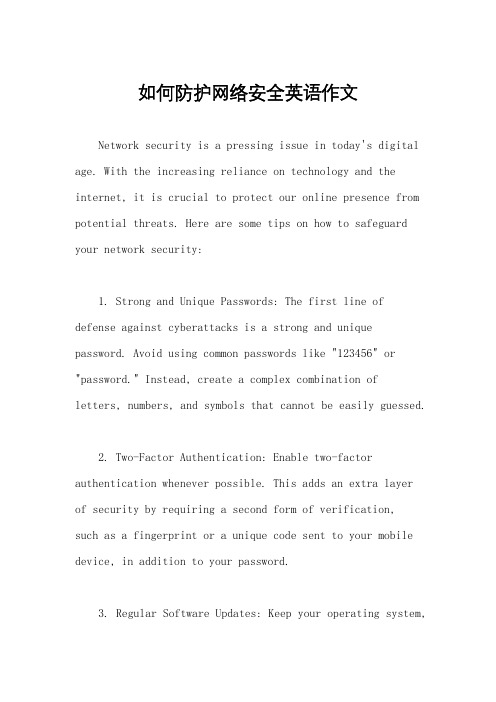
如何防护网络安全英语作文Network security is a pressing issue in today's digital age. With the increasing reliance on technology and the internet, it is crucial to protect our online presence from potential threats. Here are some tips on how to safeguard your network security:1. Strong and Unique Passwords: The first line of defense against cyberattacks is a strong and unique password. Avoid using common passwords like "123456" or "password." Instead, create a complex combination ofletters, numbers, and symbols that cannot be easily guessed.2. Two-Factor Authentication: Enable two-factor authentication whenever possible. This adds an extra layerof security by requiring a second form of verification,such as a fingerprint or a unique code sent to your mobile device, in addition to your password.3. Regular Software Updates: Keep your operating system,antivirus software, and other applications up to date. Software updates often include security patches that address vulnerabilities and protect against new threats.4. Be Cautious of Phishing Attempts: Be wary of emails, messages, or phone calls asking for personal information or login credentials. Phishing attempts often mimic legitimate organizations, so double-check the sender's email address or contact the organization directly to verify the request.5. Use a Firewall: A firewall acts as a barrier between your computer and the internet, monitoring incoming and outgoing network traffic. Enable a firewall on your devices to block unauthorized access and protect against potential threats.6. Secure Wi-Fi Networks: Change the default password of your Wi-Fi router and use a strong encryption method, such as WPA2, to secure your wireless network. Avoid using public Wi-Fi networks for sensitive activities like online banking or shopping.7. Regular Backups: Regularly backup your important files and data to an external hard drive or cloud storage. In the event of a cyberattack or system failure, you can restore your files without losing valuable information.8. Educate Yourself: Stay informed about the latest cybersecurity threats and best practices. Attend workshops, read articles, and follow reputable sources to enhance your knowledge and awareness of network security.9. Use Antivirus Software: Install reputable antivirus software on your devices and keep it updated. Antivirus software scans for and removes malware, viruses, and other malicious software that can compromise your network security.10. Limit Personal Information Sharing: Be cautious about sharing personal information online, especially on social media platforms. Limit the amount of personal information you share and adjust privacy settings tocontrol who can access your information.In conclusion, network security is essential in today's digital world. By following these tips, you can enhance your network security and protect yourself from potential cyber threats. Stay vigilant and proactive in safeguarding your online presence.。
如何预防黑客攻击英文作文
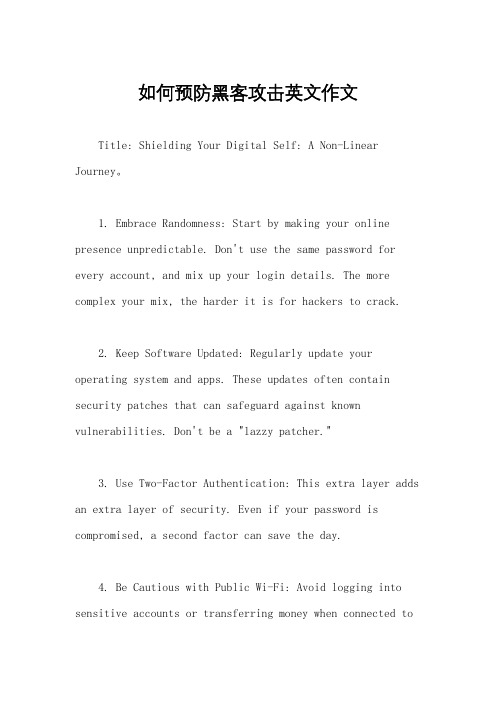
如何预防黑客攻击英文作文Title: Shielding Your Digital Self: A Non-Linear Journey。
1. Embrace Randomness: Start by making your online presence unpredictable. Don't use the same password for every account, and mix up your login details. The more complex your mix, the harder it is for hackers to crack.2. Keep Software Updated: Regularly update your operating system and apps. These updates often contain security patches that can safeguard against known vulnerabilities. Don't be a "lazzy patcher."3. Use Two-Factor Authentication: This extra layer adds an extra layer of security. Even if your password is compromised, a second factor can save the day.4. Be Cautious with Public Wi-Fi: Avoid logging into sensitive accounts or transferring money when connected topublic networks. They're often less secure, and hackers love the unguarded spots.5. Shred Your Docs: When you're done with sensitive documents, don't just recycle them. Shred them properly to prevent sensitive information from falling into the wrong hands.6. Educate Yourself: Stay informed about the latest phishing scams and online threats. The more you know, the better you can spot and avoid them.7. Use Strong Password Managers: These tools generate and store complex passwords for you, saving you the trouble of remembering them all.8. Practice Privacy: Be mindful of what you share online. Don't overshare personal details, and always review your privacy settings.9. Back Up Your Data: Regularly back up your files to an external drive or cloud service. This ensures that evenif your device is compromised, you have a copy of your data.10. Be Patient and Perseverant: Remember, no system is completely foolproof. If you suspect a breach, act quickly and report it to the authorities.In conclusion, protecting yourself from hackers is a continuous dance of staying vigilant and adapting to new threats. By following these guidelines, you can minimizethe risk and enjoy a safer digital life.。
防范网络风险的英语作文
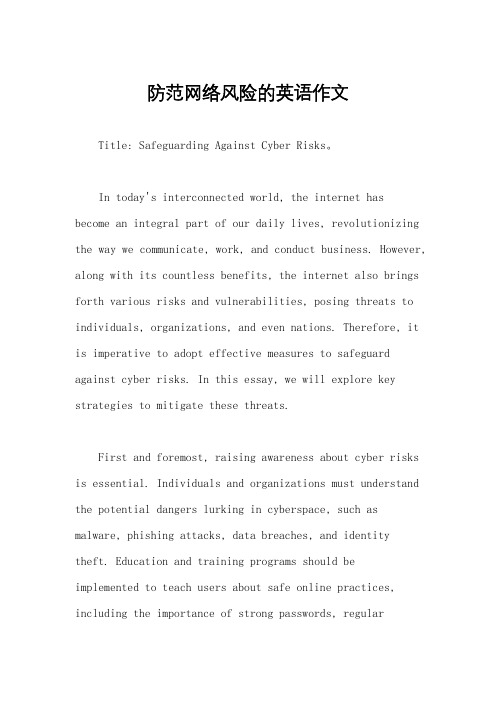
防范网络风险的英语作文Title: Safeguarding Against Cyber Risks。
In today's interconnected world, the internet has become an integral part of our daily lives, revolutionizing the way we communicate, work, and conduct business. However, along with its countless benefits, the internet also brings forth various risks and vulnerabilities, posing threats to individuals, organizations, and even nations. Therefore, it is imperative to adopt effective measures to safeguard against cyber risks. In this essay, we will explore key strategies to mitigate these threats.First and foremost, raising awareness about cyber risks is essential. Individuals and organizations must understand the potential dangers lurking in cyberspace, such as malware, phishing attacks, data breaches, and identity theft. Education and training programs should be implemented to teach users about safe online practices, including the importance of strong passwords, regularsoftware updates, and being cautious of suspicious emails and links.Moreover, implementing robust cybersecurity measures is crucial. This includes deploying firewalls, antivirus software, and intrusion detection systems to protect networks and devices from unauthorized access and malicious activities. Encryption techniques should be utilized to secure sensitive data both in transit and at rest. Additionally, regular security audits and vulnerability assessments should be conducted to identify and address any weaknesses in the system.Furthermore, fostering a culture of cybersecuritywithin organizations is paramount. Employees should be actively involved in maintaining a secure environment by adhering to company policies and procedures regarding information security. This involves practicing good cyber hygiene, such as locking devices when not in use, avoiding the use of unsecured public Wi-Fi networks, and reporting any suspicious incidents to the IT department.Another crucial aspect of safeguarding against cyber risks is collaboration and information sharing. Cyber threats are constantly evolving, and no single entity can tackle them alone. Therefore, cooperation between governments, businesses, cybersecurity experts, and other stakeholders is essential to exchange threat intelligence, best practices, and resources. Initiatives such as information sharing platforms, public-private partnerships, and joint cybersecurity exercises can enhance collective defense against cyber attacks.Additionally, investing in research and development is key to staying ahead of cyber threats. Technology is constantly evolving, and so are the tactics employed by cybercriminals. By funding research into innovative cybersecurity solutions, such as artificial intelligence, machine learning, and behavioral analytics, we can better detect, prevent, and respond to cyber attacks in real-time.Furthermore, legal and regulatory frameworks play a crucial role in combating cyber risks. Governments should enact laws and regulations that establish clear guidelinesfor cybersecurity standards, incident reporting requirements, and penalties for cybercrime. Compliance with these regulations not only helps organizations avoid legal repercussions but also encourages them to prioritize cybersecurity as a fundamental aspect of their operations.In conclusion, safeguarding against cyber risks requires a multifaceted approach involving awareness, technology, culture, collaboration, research, and regulation. By implementing comprehensive cybersecurity strategies, we can better protect our digital assets, privacy, and overall well-being in an increasingly connected world. Only through collective efforts and constant vigilance can we effectively mitigate the ever-growing threats posed by cybercriminals.。
有关网络入侵的英语作文
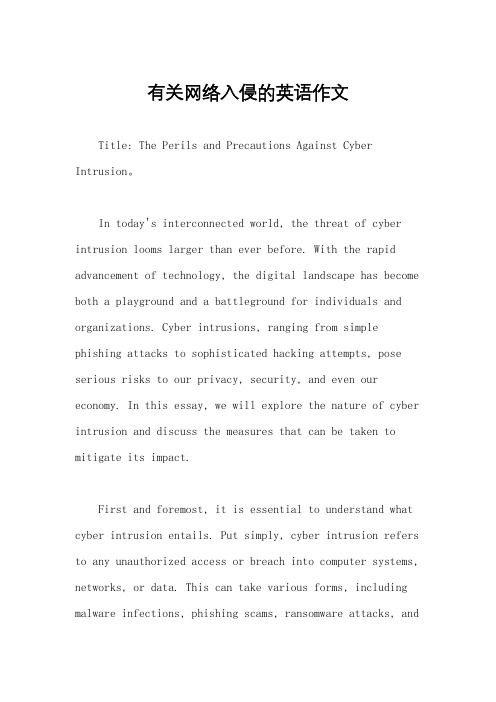
有关网络入侵的英语作文Title: The Perils and Precautions Against Cyber Intrusion。
In today's interconnected world, the threat of cyber intrusion looms larger than ever before. With the rapid advancement of technology, the digital landscape has become both a playground and a battleground for individuals and organizations. Cyber intrusions, ranging from simple phishing attacks to sophisticated hacking attempts, pose serious risks to our privacy, security, and even our economy. In this essay, we will explore the nature of cyber intrusion and discuss the measures that can be taken to mitigate its impact.First and foremost, it is essential to understand what cyber intrusion entails. Put simply, cyber intrusion refers to any unauthorized access or breach into computer systems, networks, or data. This can take various forms, including malware infections, phishing scams, ransomware attacks, andnetwork breaches. The motives behind cyber intrusions can vary widely, from financial gain to espionage to activism. Regardless of the motive, the consequences can be severe, ranging from financial losses and data theft toreputational damage and even national security threats.One of the most common forms of cyber intrusion is phishing, where attackers use deceptive emails or messages to trick individuals into revealing sensitive information such as passwords or financial details. These phishing attempts often masquerade as legitimate communications from trusted sources, making them difficult to identify. To guard against phishing, individuals should be vigilant and cautious when clicking on links or downloading attachments, especially if they seem suspicious or unsolicited.Another prevalent threat is malware, malicious software designed to infiltrate and damage computer systems. Malware can take many forms, including viruses, worms, trojans, and ransomware. Once installed on a system, malware can steal data, disrupt operations, or even render the system unusable. To protect against malware, it is essential touse reputable antivirus software, keep systems and software updated with the latest security patches, and exercise caution when downloading files or visiting unfamiliar websites.In addition to these external threats, organizations must also be mindful of insider threats, where individuals within the organization misuse their access privileges for malicious purposes. Insider threats can be particularly challenging to detect and prevent since the perpetrators often have legitimate access to sensitive data and systems. To mitigate insider threats, organizations should implement robust access controls, conduct regular security training and awareness programs, and monitor user activity for suspicious behavior.Furthermore, as our society becomes increasinglyreliant on interconnected devices and systems, the risk of cyber intrusion extends beyond computers and networks to include IoT (Internet of Things) devices such as smart home appliances, wearable devices, and industrial control systems. These devices, while offering convenience andefficiency, also introduce new vulnerabilities that can be exploited by attackers. To safeguard against IoT-related cyber intrusions, manufacturers should prioritize security in the design and development of these devices, and users should take steps to secure their devices with strong passwords and regular firmware updates.In conclusion, cyber intrusion poses a significant and growing threat in our digital age. From phishing and malware to insider threats and IoT vulnerabilities, the risks are diverse and ever-evolving. However, by understanding the nature of these threats and implementing appropriate safeguards and best practices, individuals and organizations can reduce their susceptibility to cyber intrusion and protect themselves against potential harm. Ultimately, vigilance, awareness, and collaboration are key to defending against the perils of cyber intrusion and ensuring a safer and more secure digital future.。
大学生如何打击和预防网络犯罪英语作文
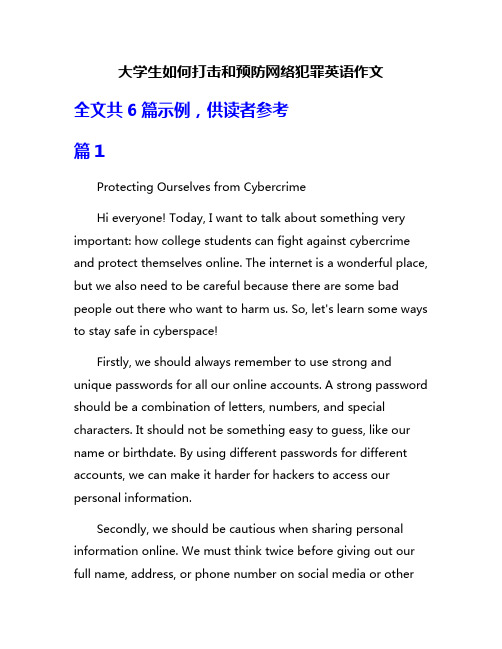
大学生如何打击和预防网络犯罪英语作文全文共6篇示例,供读者参考篇1Protecting Ourselves from CybercrimeHi everyone! Today, I want to talk about something very important: how college students can fight against cybercrime and protect themselves online. The internet is a wonderful place, but we also need to be careful because there are some bad people out there who want to harm us. So, let's learn some ways to stay safe in cyberspace!Firstly, we should always remember to use strong and unique passwords for all our online accounts. A strong password should be a combination of letters, numbers, and special characters. It should not be something easy to guess, like our name or birthdate. By using different passwords for different accounts, we can make it harder for hackers to access our personal information.Secondly, we should be cautious when sharing personal information online. We must think twice before giving out our full name, address, or phone number on social media or otherwebsites. It's better to keep these details private and only share them with trusted friends and family members. Remember, not everyone on the internet is who they say they are!Another important point is to be aware of phishing emails and scams. If we receive an email or message from someone we don't know, asking for our personal information or money, we should be suspicious. It's better to double-check with our parents, teachers, or other trusted adults before responding to such messages. They can help us determine if it's a legitimate request or a scam.It's also crucial to be mindful of what we post on social media. We should think before sharing pictures or information that could be used against us. Once something is on the internet, it's hard to completely erase it. We should always remember to set our social media accounts to private so that only our approved friends can see our posts.Lastly, we should keep our devices and software up to date. Regularly updating our computers, smartphones, and other devices ensures that we have the latest security patches and protection against cyber threats. We should also install reliable antivirus software to detect and remove any malicious programs that might harm our devices.By following these steps, we can play an active role in protecting ourselves from cybercrime. It's important to stay informed about the latest online safety practices and share this knowledge with our friends and family. Together, we can create a safer online environment for everyone.Remember, the internet is a powerful tool, and we should use it responsibly. Let's be smart, stay safe, and enjoy all the wonderful things the internet has to offer!Take care and stay safe!Love,[Your Name]Word Count: 275篇2How to Fight and Prevent Cybercrime as a College StudentHello everyone! Today I want to talk about an important topic - cybercrime. Cybercrime is when bad people use computers and the internet to do bad things. As college students, we need to know how to protect ourselves and fight against cybercrime. Here are some tips to help us stay safe online!Firstly, it's important to use strong passwords. A password is like a secret code that keeps our online accounts safe. We should use a mix of letters, numbers, and special characters to make our passwords strong. It's also a good idea to change our passwords regularly and not share them with anyone. Remember, a strong password is a good defense against cybercriminals!Next, we should be careful about what we share online. Sometimes, bad people pretend to be nice and trick us into giving them personal information. We should never share our full name, phone number, address, or school details with strangers on the internet. If someone we don't know asks for this information, we should tell a trusted adult right away.Another way to prevent cybercrime is to be cautious when clicking on links or downloading files. Cybercriminals often send harmful links or files that can damage our computer or steal our information. We should only click on links from trusted sources and avoid downloading anything from unknown websites. If something looks suspicious, it's better to be safe and not click on it.It's also important to be aware of online scams. Scams are tricks that cybercriminals use to steal our money or personal information. They may send emails or messages pretending tobe our bank or a popular website. We should never give our bank account details or credit card information to anyone online unless we are sure it's a trusted and secure website. If we receive a suspicious message, it's always a good idea to double-check with a trusted adult.Lastly, we should keep our devices and software up to date. Sometimes, cybercriminals find vulnerabilities in old software and use them to attack our devices. By regularly updating our devices and software, we can fix these vulnerabilities and stay protected.In conclusion, cybercrime is a serious issue, and as college students, we need to know how to fight against it. By using strong passwords, being cautious online, avoiding scams, and keeping our devices updated, we can protect ourselves from cybercriminals. Remember, it's always better to be safe than sorry. Let's stay smart and stay safe in the digital world!I hope you found these tips helpful. Stay safe and remember to always be cautious when using the internet. Together, we can fight against cybercrime!篇3Protecting Ourselves from Online CrimeHello everyone! I am here to talk about something really important – how to protect ourselves from online crime. As college students, we love using the internet for studying, connecting with friends, and exploring new things. But we also need to be aware of the dangers that come with it. Here are some tips on how we can fight against and prevent online crime.Strong Passwords: Just like we protect our secret clubhouse with a secret password, we need to protect our online accounts with strong passwords. A strong password should be a combination of letters, numbers, and special characters. And remember, never share your password with anyone, not even your best friend!Be Wary of Strangers: We all know not to talk to strangers in real life, but the same applies online. Be very careful when someone you don't know tries to befriend you or asks for personal information. It's better to be safe than sorry, so always check with a trusted adult or ignore the message altogether.Think Before You Click: Sometimes, we receive emails or messages with links or attachments. But be careful! These could be harmful and containviruses. If you receive something suspicious, don't click on it. Instead, ask an adult or a tech-savvy friend for help.Privacy Settings: Just like we draw curtains to keep our rooms private, we can also use privacy settings to protect our online profiles. Make sure to set your social media accounts to private, so only your friends can see your posts and personal information. It's important to keep our personal lives safe from prying eyes.Safe Online Shopping: We all love to shop online, but let's be smart about it. Only buy from trusted websites that use secure payment methods. Check for the padlock symbol in the browser's address bar to ensure the website is safe. And never give your credit card details or personal information to a website that doesn't seem trustworthy.Report and Block: If you come across something online that makes you uncomfortable or seems illegal, report it! Social media platforms and websites have reporting options for a reason. By reporting suspicious activities, we can help make the online world safer for everyone. And if someone is bothering you, don't hesitate toblock them. Remember, you have the power to control your online experience.Stay Updated: Just like we need to keep up with our favorite cartoon shows, we also need to stay updated about online safety. Technology changes quickly, and so do the tricks of online criminals. Make sure to read news articles or talk to adults who can keep you informed about the latest online threats. The more we know, the better we can protect ourselves.Remember, my friends, the internet is a wonderful place filled with knowledge and fun, but it's important to stay safe. By following these tips, we can protect ourselves from online crime and enjoy all the good things the internet has to offer. Let's be smart, responsible, and always remember to ask for help when we are unsure. Together, we can create a safer online world for everyone!篇4How College Students Can Fight and Prevent CybercrimeHello everyone! I am a little elementary school student, and today I want to talk to you about an important topic: how collegestudents can fight and prevent cybercrime. The internet is a wonderful place where we can learn, play, and connect with others, but it's also important to be safe and protect ourselves from online dangers. Here are some tips for college students to stay safe online:Use strong and unique passwords: It's really important to have strong and unique passwords for all your online accounts. A strong password is one that includes a combination of letters, numbers, and special characters. Also, make sure you don't use the same password for multiple accounts. This way, even if one account is hacked, your other accounts will still be safe.Be cautious of phishing scams: Phishing scams are when someone tries to trick you into giving them your personal information, such as passwords or credit card details. Always be careful when clicking on links in emails or messages, especially if they ask you to provide personal information. If something seems suspicious, it's best to double-check with a trusted adult or the university's IT department before taking any action.Be mindful of what you share online: Remember that whatever you post online can be seen by others, so be careful about the information you share. Avoid posting personal details like your address, phone number, or financial information on social media or other public platforms. It's also a good idea to review your privacy settings to ensure that only people you trust can see your posts.Update your software and devices: Regularly updating your software and devices is crucial for staying safe online. Software updates often include important security patches that fix vulnerabilities in the system. Make sure to install updates for your operating system, antivirus software, and other applications to keep your devices protected.Use secure Wi-Fi networks: When connecting to the internet, try to use secure Wi-Fi networks that require a password. Public Wi-Fi networks, such as those in cafes or libraries, can be risky because hackers may try to intercept your data. If you need to use public Wi-Fi, avoid accessing sensitive information like online banking or shopping sites.Be cautious with online friendships: While it's great to make friends online, it's important to be cautious. Not everyone online is who they say they are, so be careful about sharing personal information or meeting up with people you've only met online. It's always a good idea to talk to a trusted adult or a university counselor if you have any concerns about an online friendship.Report cybercrime: If you come across any form of cybercrime, such as online harassment or fraud, it's important to report it. Most universities have dedicated resources or IT departments that can help you with such issues. By reporting cybercrime, you not only protect yourself but also help prevent others from becoming victims.Remember, staying safe online is a shared responsibility. Always be vigilant and keep yourself informed about the latest online threats. By following these tips and being cautious, college students can fight against cybercrime and create a safer online environment for everyone. Stay safe and enjoy your time on the internet!That's all for today, my dear friends. I hope you found these tips helpful. Let's be smart and responsible internet users together!篇5How to Fight Bad Guys on the InternetHi friends! Today I want to talk about something really important - staying safe from the bad guys on the internet. The internet is awesome and lets us learn, play games, watch videos, and talk to our friends. But there are also some meanies out there who try to steal info, break into accounts, and cause trouble online. They're called cybercriminals.College students have to be extra careful because they often have important stuff on their laptops and phones like papers for class, bank info, emails, and private pics. The bad guys would just love to get their hands on that kind of stuff! That's why it's so crucial for college kids to know how to fight back against cybercrime.Here are some tips that can help keep you safe online:Use Strong Password ProtectionThis is like your first line of defense against the hackers. Using weak passwords or the same password across multiple accounts is just asking for trouble. Instead, you want passwords that are really long and complex, with uppercase, lowercase,numbers, and symbols all mixed up. That makes them super hard to crack.It's also best to use a different unique password for each important account you have. That way if one does get hacked, your other accounts are still safe. Writing them all down in a secret notebook can help you remember them.Install Anti-Virus/Anti-MalwareViruses, malware, and other nasty bugs are how a lot of cybercriminals try to infiltrate your devices. But you can stop them by installing anti-virus and anti-malware software. This will scan your computer and zap any threats before they can cause damage.Just be sure to keep the anti-virus updated so it can detect the latest malware strains that pop up. Let it run frequent scans to catch anything fishy. Most colleges provide anti-virus for students, but you can also get it on your own.Use Two-Factor AuthenticationThis adds an extra layer of security on top of your password. Two-factor authentication requires a second step to verify it's really you trying to login, like entering a code sent to your phone.That way, even if a hacker does get your password, they still can't access your account without that second verification step.It takes a tiny bit more work, but two-factor auth will lockout hackers and give you great peace of mind. Be sure to enable it everywhere you can - email, banking, social media, and more.Be Careful What You ClickA lot of cyberattacks happen when you accidentally click on something malicious like a weird link or email attachment. The bad guys are super tricky and will try to disguise these as something legit to lure you in.So be very cautious about any links or attachments you get, even if they seem to come from a friend or company you know. Verify they're safe before clicking. When in doubt, call your friend or the company to check if they really sent you that file. It's better to be safe than sorry!Watch What You ShareWe all love posting fun pics and updates for our friends online. But you have to be smart about what kind of personal info you share, because hackers love to piece things together to steal identities, open credit cards, or commit other crimes in your name.Avoid putting stuff like your birth date, address, full name and location, or passwords/PINs anywhere public. Be cautious aboutsharing private pics or secrets too. The internet is forever, so think twice before posting something you may regret later!By following these cybersecurity tips, you can help fend off the sneaky criminal hackers and enjoy the internet safely during your college years. Stay alert, use protection, and don't make it easy for those bad guys to get into your stuff. Power to the good folks online! Let me know if you have any other questions!篇6How to Fight and Stop Bad Computer CrimesHi there! My name is Timmy and I'm going to tell you all about bad computer crimes that happen on the internet. The grown-ups call them "cyber crimes." A lot of students in university have to learn about this stuff because it's really important.Cyber crimes are any crimes that happen by using a computer or the internet. They can be really bad and hurt a lot of people! Some examples are hackers breaking into systems, viruses that mess up your files, and people trying to steal your private information like passwords. There's also cyber bullieswho are mean online, and predators who try to trick kids. Some cyber criminals even help terrorists! It's a huge problem these days.But don't worry, there are ways to fight back against the bad guys! University students are taught all about cyber security to help protect themselves and others. I'll explain some of the biggest cyber threats and how to stay safe.One of the biggest threats is malware, which means malicious software nasties like viruses and ransomware. Viruses can corrupt your files and make your computer go crazy! Ransomware locks you out of your own files until you pay money to the cyber crooks. It's like they kidnap your data! The best way to stop malware is by using good anti-virus software that catches it before it infects your system.Phishing is another big problem where sneaky people try to trick you into giving away your passwords or payment info. They might send fake emails pretending to be your bank, or make copycat websites to steal your login details. You have to be really careful about any links you click or info you enter online. Always double check that websites are legit before logging in!Hacking is when bad guys try to break into computer systems that don't belong to them. Some do it for fun, otherswant to cause trouble, and some are after secret data they can sell. Hackers use clever programs to guess passwords or find security holes. That's why it's super important to have strong passcodes and keep software updated to fix any vulnerabilities.Speaking of passwords, you gotta make them really hard to guess but still memorable for you. Don't use easy words, birthdays, or your name because those are too easy to figure out. Instead, use random combos of letters, numbers, and symbols. And definitely don't use the same password everywhere! If it gets hacked once, the crooks have the key to all your accounts.Anyway, those are some of the biggest cyber crime dangers out there. Now I'll talk about some of the best ways university students can help fight back and keep the internet safe:First off, get good anti-virus protection and keep it updated! Let it scan your system regularly to catch any nasties. And be crazy careful about what programs you download or install, because some can hide malware inside.Next, watch out for any phishy emails or websites asking for private info. Never click sketchy links or enter your login unless you're 100% sure it's the real website. When in doubt, just stay out!Use strong unique passwords everywhere and change them up frequently, especially if you suspect any accounts were compromised. Consider getting password manager software to create and store crazy secure passwords for you.Keep your software and operating systems updated with the latest security patches. The developers are always fixing vulnerabilities that sneaky hackers find.Be careful what you share and post online, because anything can be found and used against you by cyber creeps. Don't share too much personal info or inappropriate pics/vids that could come back to haunt you.Never opening files or clicking links from strangers or untrusted sources. That's one of the top ways malware gets spread around! Be wary of public WiFi hotspots too since they can be snooped on.If you do get caught up in some cyber monkey business like identity theft or stalking, report it right away! Authorities can help track down the bad guys and prevent it from getting worse.Lastly, university students should seriously consider studying cyber security themselves! The good guys need as many white hat hackers and security experts as possible these days. Withmore defenders than attackers, we can help make the internet a safer place for everyone.Well, that's my quick guide on the scary cyber crime world and how to fight back against those computer crooks! I know it's a lot to take in, but this stuff is super important, especially for university students joined at the hip with their tech. Stay safe out there, listen to your computer security lessons, and be cyber heroes! The internet is counting on you!。
如何防止网络犯罪英语作文
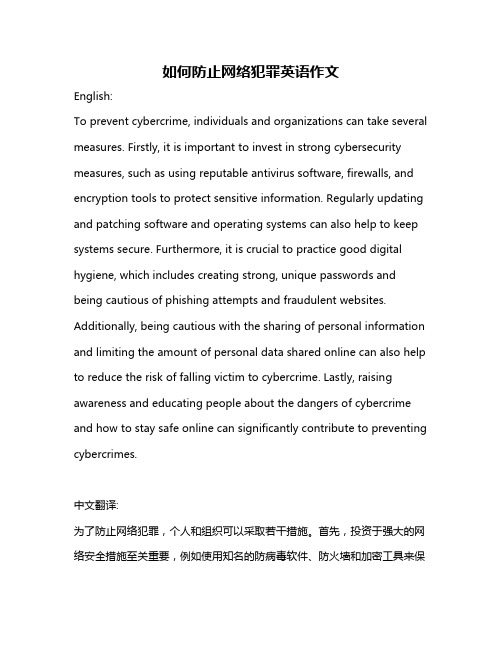
如何防止网络犯罪英语作文English:To prevent cybercrime, individuals and organizations can take several measures. Firstly, it is important to invest in strong cybersecurity measures, such as using reputable antivirus software, firewalls, and encryption tools to protect sensitive information. Regularly updating and patching software and operating systems can also help to keep systems secure. Furthermore, it is crucial to practice good digital hygiene, which includes creating strong, unique passwords and being cautious of phishing attempts and fraudulent websites. Additionally, being cautious with the sharing of personal information and limiting the amount of personal data shared online can also help to reduce the risk of falling victim to cybercrime. Lastly, raising awareness and educating people about the dangers of cybercrime and how to stay safe online can significantly contribute to preventing cybercrimes.中文翻译:为了防止网络犯罪,个人和组织可以采取若干措施。
如何防范网络攻击作文素材

如何防范网络攻击作文素材英文回答:Cyber attacks have become increasingly prevalent in today's digital age, posing a significant threat to individuals, businesses, and even governments. To effectively guard against such attacks, it is crucial to adopt various preventive measures and strategies.Firstly, one must ensure the use of strong and unique passwords for all online accounts. This means avoiding common passwords such as "123456" or "password" and instead using a combination of letters, numbers, and special characters. Additionally, enabling two-factor authentication adds an extra layer of security by requiring a second form of verification, such as a fingerprint or a unique code sent to a mobile device.Secondly, keeping all software and devices up-to-date is essential. Regularly installing updates and patcheshelps to fix any vulnerabilities that hackers may exploit. This applies not only to operating systems but also to antivirus software, firewalls, and other security applications.Furthermore, being cautious of phishing attempts is crucial. Phishing is a technique used by hackers to trick individuals into revealing sensitive information, such as passwords or credit card details, by impersonating a legitimate entity. It is important to be skeptical of suspicious emails, messages, or websites that ask for personal information. Verifying the authenticity of the sender or website before providing any sensitive data is a wise practice.Moreover, it is advisable to use a reliable and secure internet connection. Public Wi-Fi networks, for example, are often unsecured and can be easily compromised by attackers. When accessing sensitive information or conducting financial transactions, it is recommended to use a virtual private network (VPN) to encrypt the data and ensure a secure connection.Lastly, regularly backing up important data isessential in case of a successful cyber attack. This prevents the loss of valuable information and enables quick recovery without having to pay ransomware demands. Cloud storage or external hard drives are convenient options for data backup.In conclusion, protecting oneself from cyber attacks requires a combination of strong passwords, regular software updates, vigilance against phishing attempts, secure internet connections, and data backups. By implementing these preventive measures, individuals and organizations can minimize the risk of falling victim to cybercrime.中文回答:网络攻击在当今数字时代变得越来越普遍,对个人、企业甚至政府构成了重大威胁。
英语必修二关于网络安全作文
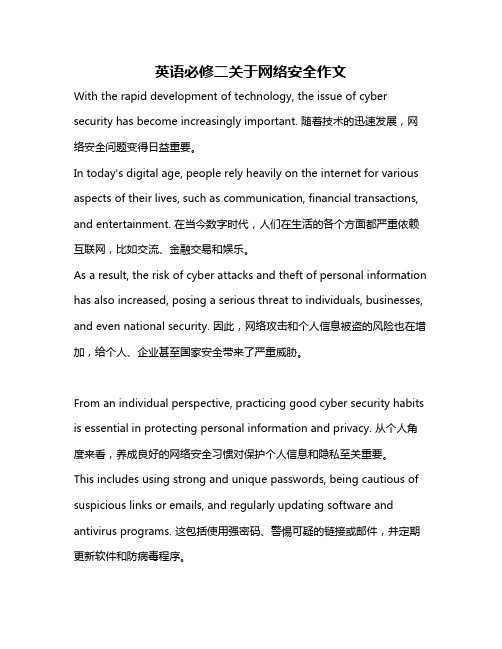
英语必修二关于网络安全作文With the rapid development of technology, the issue of cyber security has become increasingly important. 随着技术的迅速发展,网络安全问题变得日益重要。
In today's digital age, people rely heavily on the internet for various aspects of their lives, such as communication, financial transactions, and entertainment. 在当今数字时代,人们在生活的各个方面都严重依赖互联网,比如交流、金融交易和娱乐。
As a result, the risk of cyber attacks and theft of personal information has also increased, posing a serious threat to individuals, businesses, and even national security. 因此,网络攻击和个人信息被盗的风险也在增加,给个人、企业甚至国家安全带来了严重威胁。
From an individual perspective, practicing good cyber security habits is essential in protecting personal information and privacy. 从个人角度来看,养成良好的网络安全习惯对保护个人信息和隐私至关重要。
This includes using strong and unique passwords, being cautious of suspicious links or emails, and regularly updating software and antivirus programs. 这包括使用强密码、警惕可疑的链接或邮件,并定期更新软件和防病毒程序。
英语作文防范网络安全问题的做法
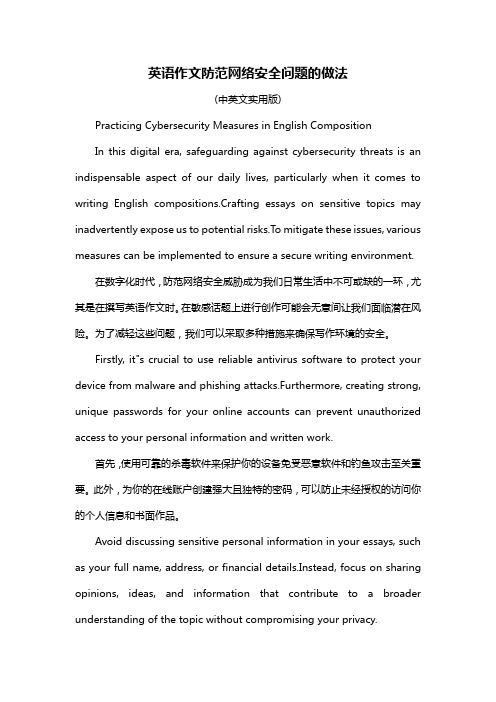
英语作文防范网络安全问题的做法(中英文实用版)Practicing Cybersecurity Measures in English CompositionIn this digital era, safeguarding against cybersecurity threats is an indispensable aspect of our daily lives, particularly when it comes to writing English compositions.Crafting essays on sensitive topics may inadvertently expose us to potential risks.To mitigate these issues, various measures can be implemented to ensure a secure writing environment.在数字化时代,防范网络安全威胁成为我们日常生活中不可或缺的一环,尤其是在撰写英语作文时。
在敏感话题上进行创作可能会无意间让我们面临潜在风险。
为了减轻这些问题,我们可以采取多种措施来确保写作环境的安全。
Firstly, it"s crucial to use reliable antivirus software to protect your device from malware and phishing attacks.Furthermore, creating strong, unique passwords for your online accounts can prevent unauthorized access to your personal information and written work.首先,使用可靠的杀毒软件来保护你的设备免受恶意软件和钓鱼攻击至关重要。
英语必修二网络安全作文
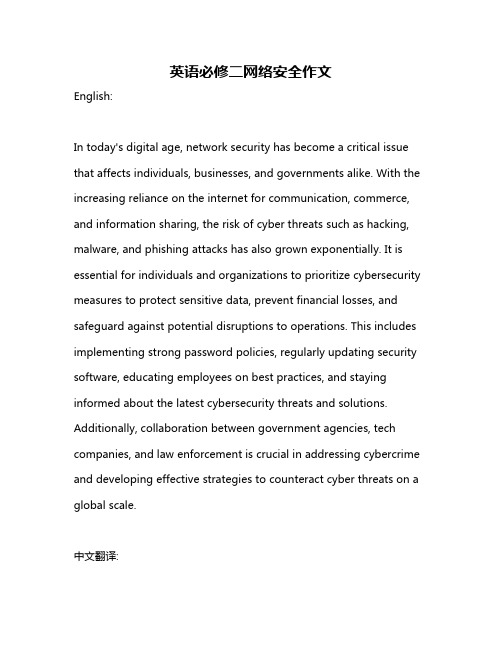
英语必修二网络安全作文English:In today's digital age, network security has become a critical issue that affects individuals, businesses, and governments alike. With the increasing reliance on the internet for communication, commerce, and information sharing, the risk of cyber threats such as hacking, malware, and phishing attacks has also grown exponentially. It is essential for individuals and organizations to prioritize cybersecurity measures to protect sensitive data, prevent financial losses, and safeguard against potential disruptions to operations. This includes implementing strong password policies, regularly updating security software, educating employees on best practices, and staying informed about the latest cybersecurity threats and solutions. Additionally, collaboration between government agencies, tech companies, and law enforcement is crucial in addressing cybercrime and developing effective strategies to counteract cyber threats on a global scale.中文翻译:在今天的数字时代,网络安全已经成为一个影响个人、企业和政府的关键问题。
- 1、下载文档前请自行甄别文档内容的完整性,平台不提供额外的编辑、内容补充、找答案等附加服务。
- 2、"仅部分预览"的文档,不可在线预览部分如存在完整性等问题,可反馈申请退款(可完整预览的文档不适用该条件!)。
- 3、如文档侵犯您的权益,请联系客服反馈,我们会尽快为您处理(人工客服工作时间:9:00-18:30)。
计算机网络攻击和防范摘要:网络信息的安全和保密是一个至关重要的问题。
无论是在局域网还是在广域网中,都存在着自然和人为等诸多因素的脆弱性和潜在威胁。
关键词:计算机;网络;安全;防范引言:本文旨在介绍现在的网络安全问题,网络攻击的方式,步骤,防范。
防火墙的结构,类型,和具体应用。
使大家对于一般的网络攻击有所防范,可以用防火墙进行查杀和防护病毒。
正文:网络安全,是计算机信息系统安全的一个重要方面。
如同打开了的潘多拉魔盒,计算机系统的互联,在大大扩展信息资源的共享空间的同时,也将其本身暴露在更多恶意攻击之下。
如何保证网络信息存储、处理的安全和信息传输的安全的问题,就是我们所谓的计算机网络安全。
信息安全是指防止信息财产被故意的或偶然的非法授权泄露、更改、破坏或使信息被非法系统辩识、控制;确保信息的保密性、完整性、可用性、可控性。
信息安全包括操作系统安全、数据库安全、网络安全、病毒防护、访问控制、加密和鉴别七个方面。
设计一个安全网络系统,必须做到既能有效地防止对网络系统的各种各样的攻击,保证系统的安全,同时又要有较高的成本效益,操作的简易性,以及对用户的透明性和界面的友好性。
网络安全攻击,主要有四种方式L中断、截获、修改和伪造。
中断是以可用性作为攻击目标,它毁坏系统资源,使网络不可用。
截获是以保密性作为攻击目标,非授权用户通过某种手段获得对系统资源的访问。
修改是以完整性作为攻击目标,非授权用户不仅获得访问而且对数据进行修改。
伪造是以完整性作为攻击目标,非授权用户将伪造的数据插入到正常传输的数据中。
网络安全的解决方案一、入侵检测系统部署入侵检测能力是衡量一个防御体系是否完整有效的重要因素,强大完整的入侵检测体系可以弥补防火墙相对静态防御的不足。
对来自外部网和校园网内部的各种行为进行实时检测,及时发现各种可能的攻击企图,并采取相应的措施。
具体来讲,就是将入侵检测引擎接入中心交换机上。
入侵检测系统集入侵检测、网络管理和网络监视功能于一身,能实时捕获内外网之间传输的所有数据,利用内置的攻击特征库,使用模式匹配和智能分析的方法,检测网络上发生的入侵行为和异常现象,并在数据库中记录有关事件,作为网络管理员事后分析的依据;如果情况严重,系统可以发出实时报警,使得学校管理员能够及时采取应对措施。
二、漏洞扫描系统采用目前最先进的漏洞扫描系统定期对工作站、服务器、交换机等进行安全检查,并根据检查结果向系统管理员提供详细可靠的安全性分析报告,为提高网络安全整体水平产生重要依据。
三、网络版杀毒产品部署在该网络防病毒方案中,我们最终要达到一个目的就是:要在整个局域网内杜绝病毒的感染、传播和发作,为了实现这一点,我们应该在整个网络内可能感染和传播病毒的地方采取相应的防病毒手段。
同时为了有效、快捷地实施和管理整个网络的防病毒体系,应能实现远程安装、智能升级、远程报警、集中管理、分布查杀等多种功能。
四、网络主机操作系统的安全和人身安全的措施网络防火墙作为第一道防线,并不能完全保护内部网络,必须结合其他措施,以改善该系统的安全水平。
经过防火墙是基于网络的主机操作系统的安全和人身安全的措施。
根据级别从低到高,即人身安全,主机系统,其核心业务系统安全,系统安全,应用服务的安全和档案系统的安全,同时,主机的安全检查和错误修复,作为以及备份安全系统作为补充的安全措施。
这些构成了整个网络系统,第二道防线,主要部分的一个突破,以防止防火墙,以及攻击范围内。
系统备份是最后一道防线网络系统,用于攻击后,系统还原。
防火墙和主机安全的措施是整个系统的安全审计,入侵检测和响应处理器构成的整体安全检查和应对措施。
从网络系统的防火墙,网络主机,甚至直接从网络链路层的提取网络状态信息,输入到入侵检测子系统。
入侵检测系统按照一定的规则,以确定是否有任何入侵的事件,如果发生入侵,紧急处理措施,并产生一条警告消息。
此外,该系统的安全审计中,还可以作为未来后果的攻击行为,并处理安全政策的系统改进的信息来源。
总结:网络安全是一个综合性问题,涉及技术,管理,使用和许多其他方面,包括它自己的信息系统安全问题,有物理和逻辑的技术措施,是一种技术只能解决问题的一另一方面,而不是万能的。
参考文献:[ 1 ]黄一强,等。
论软件开发的需求分析阶段的主要任务。
季刊中山大学, 2002年( 01 )。
[ 2 ]胡道元。
计算机局域网模式[ M ] 。
北京:清华大学出版社, 2001 。
[ 3 ]朱厘森,甚至守。
计算机网络应用技术模式[ M ] 。
北京:专利文献出版社, 2001 。
[ 4 ]渫西人。
计算机网络(第四版) [ M ]档。
北京:电子工业出版社, 2003 。
[ 5 ]孙小刚,韩栋,等。
面向对象软件工程, Visual C + +的网络编程模式[ M ] 。
北京:清华大学出版社, 2004,11Computer network attacks and preventAbstract: Internet security and confidentiality of information is a critical issue. Whether in the LAN or WAN, there are both natural and man-made factors, such as the vulnerability and potential threats.Key words: computer; network; security; preventIntroduction:This paper aims to introduce the current issue of network security, network attack methods, steps to prevent. The structure of the firewall, type, and specific applications. So that in general have to guard against network attacks can be used for killing the firewall and virus protection.The Main body:Network security is the security of computer information systems in an important aspect. As the opening of Pandora's Box, the computer systems of the Internet, greatly expanded information resources sharing space at the same time, will be exposed in their own malicious more under attack. How to ensure that network storage, security and the transmission of information security, is the so-called computer network security. Information security is to prevent information from the property have been deliberately or accidentally leaked authorized illegal, altered, damage or illegal information system identification, control; ensure confidentiality, integrity, availability, controllable. Information security, including operating system security, database security, network security, virus protection, access control, encryption and identification of seven areas. Design of a network security system, we must not only effectively prevent the system to a wide range of network attacks, guarantee the safety of the system, and also have a highercost-effectiveness, operational simplicity, and transparent to the user interface and friendly.In the form of network security attacks,there are four main ways L interruption,interception, modification and forgery.Interruption of availability is the object of the attack, which destroyed the system resources, so that the network is not available.Intercepted by the object of the attack the confidentiality, non-authorized users access to a means of access to system resources.Modify the object of the attack on the integrity, non-authorized users gain access not only data but also to be amended.Forged by the integrity of the object of the attack, non-authorized users to insert forged data to normal data transmission.Network security solutionsFirst, the deployment of Intrusion Detection SystemAbility of intrusion detection is a measure of an effective defense system is an important factor in a complete, powerful intrusion detection system, a complete firewall can make up for the relative lack of static defense. From the external network and the campus network of the various acts of real-time detection, to detect all possible attempts to attack and take corresponding measures. Specifically, intrusion detection is to switch on the engine access center. Intrusion Detection System Intrusion Detection set, network management and network monitoring functions, both inside and outside the network in real-time capture of all data transmission between the use of built-in features of database attacks, the use of pattern matching and intelligence analysis to detect the occurrence of network intrusions and anomalies, and in the database record of the incident, as a network administrator based on hindsight; if in serious condition, the system real-time warning can be issued so that the school administrators to take timely measures to deal with.Second, vulnerability scanning systemUsing the most advanced system of regular vulnerability scanning workstations, servers, switches and other safety checks, and in accordance with the results to the system administrator to provide detailed and reliable analysis of the security, to enhance the overall level of network security have an important basis.Third, the network version of the deployment of antivirus productsIn the network anti-virus program, we eventually have to reach a goal is: To put an end to the LAN in the whole virus infection, dissemination and attack, in order to achieve this, we should be in the entire network at risk of infection and the spread of the virus to take place The anti-virus tools. At the same time in order to effectively and quickly implement and manage the entire network of anti-virus system, should be able to remotely install, smart upgrade, remote alarm, centralized management, distribution of a variety of functions such as killing.Forth, the network host operating system security and physical security measuresNetwork firewall as the first line of defense and can not fully protect the internal network, must be combined with other measures to improve the safety of the system level. After the firewall is based on the network host operating system security and physical security measures. In accordance with the level from low to high, namely, the physical security of the host system, the core operating system security, system security, application services security and file system security; At the same time,host security checks and bug fixes, as well as a backup safety system as a supplementary safety measures. These constitute the entire network system, the second line of defense, the main part of a breakthrough to prevent the firewall as well as attacks from within. System backup is the last line of defense network system, used to attack after the System Restore. The firewall and host security measures is the overall system security by auditing, intrusion detection and response processor constitute the overall safety inspection and response measures. It from the network system firewall, network host or even directly from the network link layer on the extraction of network status information, as input to the intrusion detection subsystem. Intrusion Detection System in accordance with certain rules to determine whether there is any invasion of the incident, if the invasion occurred, the emergency treatment measures, and generate a warning message. Moreover, the system's security audit also can be used as the future consequences of aggressive behavior and to deal with security policy on the system to improve sources of information.Summary: Network security is a comprehensive issue, involving technology, management, use and many other aspects, including both its own information system security issues, there are physical and logical technical measures, a kind of technology can only solve the problem on the one hand, rather than a panacea.References:[1] Huang Yi-qiang, et al. On the software development needs analysis phase of the main tasks. Quarterly Journal of Sun Yat-sen University, 2002 (01).[2] Hu Daoyuan. Computer LAN [M]. Beijing: Tsinghua University Press, 2001.[3] Zhu Lisen, even Shougong. Computer Network Application Technology [M]. Beijing: Patent Literature Publishing House, 2001.[4] Xie Xiren. Computer Networks (4th edition) [M]. Beijing: Publishing House of Electronics Industry, 2003.[5]孙小刚, Han Dong, et al. Oriented software engineering, Visual C + + Network Programming [M]. Beijing: Tsinghua University Press, 2004,11.。
